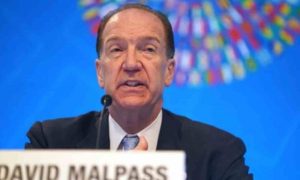
The World Bank Group has urged the Federal Government to develop policies to increase cross-border trade in Nigeria in order to support economic growth.
President of the World Bank Group, Mr. David Malpass, said during a virtual media briefing with West and Central African journalists that Nigeria has huge potential and with some of the improvements in its economic policies, growth can be rapid for people in Nigeria. He said: “We have encouraged efforts that would reduce subsidies for fossil fuel; encourage trade across borders and very importantly, multiple exchange rates have been a burden on the people of Nigeria and we have encouraged the unification of rates so that money, investments and remittances can flow in and out of Nigeria with less friction. Our programmes remain strongly supportive of the people of Nigeria and in Nigeria.”
Malpass said the multilateral institution would invest and mobilise about $150 billion in Nigeria and other African countries in the next five years. According to him, over the last 10 years, the World Bank Group has invested over $200 billion in Africa and, “in five years, we intend to invest and mobilise about $150 billion in Africa to support the continent’s recovery.”
He noted that a large portion of that would be in the form of grants and long-term zero interest rate loans from the International Development Association (IDA), an international financial institution which offers concessional loans and grants to the world’s poorest developing countries. “So, we are working on an ambitious IDA replenishment to be completed by 2021 and that would be critical for the concessional financing and grants that the IDA countries in Africa need. So, that gives you the context of the funding support that we are doing, both for the public sector and the private sector through IFC in Africa,” he said.
In his remarks, the World Bank’s Vice President, Western and Central Africa, Ousmane Diagana, said that in Africa, the Washington-based institution’s largest programmes are in Nigeria, estimated at more than $12 billion. “These are programmes under implementation in priority sectors. Access to electricity, health, water, education, agriculture, and especially this year, we have given about $2 billion to Nigeria in order to help the population have access to critical services and to provide technical assistance. We have seen progress in policies for Nigeria and the country is a very important partner for the bank,” he said.

